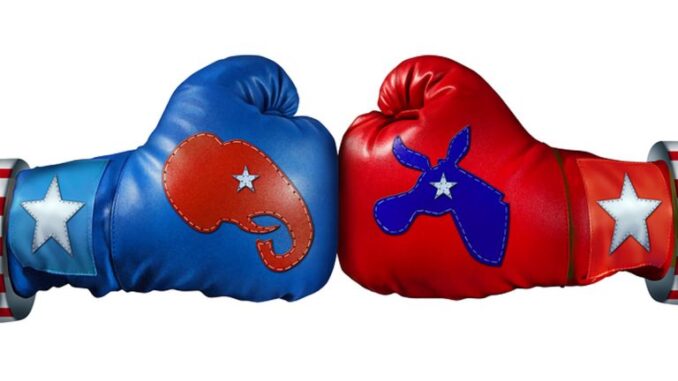
Partisan polarization has long been a fact of political life in the United States. But increasingly, Republicans and Democrats view not just the opposing party but also the people in that party in a negative light. Growing shares in each party now describe those in the other party as more closed-minded, dishonest, immoral and unintelligent than other Americans.
Perhaps the most striking change is the extent to which partisans view those in the opposing party as immoral. In 2016, about half of Republicans (47%) and slightly more than a third of Democrats (35%) said those in the other party were a lot or somewhat more immoral than other Americans. Today, 72% of Republicans regard Democrats as more immoral, and 63% of Democrats say the same about Republicans.
The pattern is similar with other negative partisan stereotypes: 72% of Republicans and 64% of Democrats say people in the opposing party are more dishonest than other Americans. Fewer than half in each party said this six years ago. Large majorities in both parties also describe those in the other party as more closed-minded than other Americans (83% of Democrats and 69% of Republicans say this), and this sentiment also has increased in recent years.
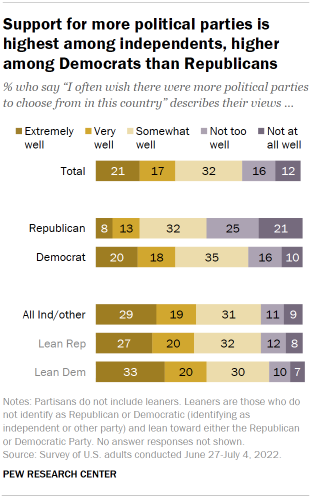
Yet there is one negative trait that Republicans are far more likely than Democrats to link to their political opponents. A 62% majority of Republicans say Democrats are “more lazy” than other Americans, up from 46% in previous studies in 2019 and 2016. Only about a quarter of Democrats (26%) say Republicans are lazier than others, and this has changed only modestly since 2016.
The new survey on parties and partisanship by Pew Research Center, conducted among 6,174 Americans between June 27 and July 4, 2022, on the nationally representative American Trends Panel, finds that negative sentiment – the belief that the opposing party’s policies are harmful to the country – remains a major factor in why Republicans and Democrats choose to affiliate with their party.
In fact, nearly equal shares of Republicans cite the harm caused by Democratic policies (78%) and the positive impact of GOP policies (76%) as major reasons why they identify with their party. This also is the case for Democrats, with identical shares (68% each) citing these negative and positive reasons for their decision to affiliate with the Democratic Party.
The belief that the opposing party’s policies are harmful to the country is a particularly prominent factor in why independents lean toward the Republican and Democratic parties. It is the only one, among the five included on this survey, cited by majorities of both Republican-leaning (57%) and Democratic-leaning independents (55%) as a major reason why they lean toward their parties.
The survey finds that while negative partisanship remains extensive – and in many cases is increasing – there also are signs of frustration with the two-party system and the parties themselves. This frustration is more evident among partisan leaners – who tend to be younger and less politically engaged than partisans – than among those who identify as Republicans or Democrats.
Among the public overall, 39% say the following describes their views extremely or very well: “I often wish there were more political parties to choose from in this country.” Another 32% say the statement describes their views somewhat well, while 28% say it describes their views not too well or not at all well.
Notably, Democrats are more likely than Republicans to express a desire for more political parties: 38% of those who identify with the Democratic Party say this describes their views extremely or very well, compared with 21% of Republicans. Yet it is among independents and others who do not identify with a party that the sentiment is most pronounced: 48% say it describes their views extremely or very well, including 48% of those who lean Republican and 53% of those who lean Democratic.
Overall, interest in having more political parties is higher among younger Americans than older adults. Nearly half of those ages 18 to 49 say they often wish there were more parties to choose from (47% say it describes their views extremely or very well); that compares with 35% of those ages 50 to 64 and just 23% of those 65 and older.
Neither party is very popular with the public: Roughly four-in-ten Americans (41%) have a very or somewhat favorable view of the Democratic Party, while even fewer (37%) have a favorable impression of the Republican Party.
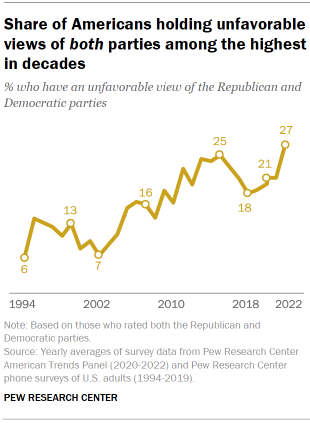
Over the past several decades, the share of Americans who express unfavorable opinions of both major parties has grown: In 1994, just 6% of the public had an unfavorable view of the Republican and Democratic parties. Today, about a quarter (27%) have negative views of both parties. This view is especially pronounced among partisan leaners: 44% of Republican-leaning independents – and an identical share of Democratic leaners – currently have negative views of both parties.
The Democratic Party has advantages over the GOP on several traits and attributes, particularly when it comes to tolerance for different types of people and not making excuses for hateful views among members of their own party. About six-in-ten adults (57%) say the phrase “respectful and tolerant of different types of people” describes the Democratic Party very or somewhat well, compared with 38% who say it describes the Republican Party.
And while 61% say the phrase “too often makes excuses for party members who have hateful views” describes the Republican Party, a smaller share (51%) say it describes the Democratic Party.
At the same time, there are more modest differences in views of the parties’ respect for the nation’s democratic institutions. About half of adults (51%) say “respects the country’s democratic institutions and traditions” describes the Democratic Party very or somewhat well, while 45% say it applies to the GOP. And neither party gets high ratings for honesty: 43% say the phrase “governs in an honest and ethical way” describes the Democratic Party, compared with 37% who characterize the Republican Party this way.
Other important findings from the survey
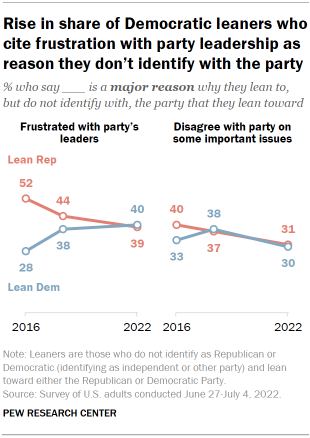
Those who lean to the Democratic Party have become more critical of Democratic leaders. When asked why they lean toward a party – rather than identify with it – many leaners say they do not want to put a political label on their views, while nearly as many offer that they are frustrated with the leadership of the party they lean toward. The share of Democratic leaners who cite frustration with the party’s leaders as a major reason for why they do not more closely associate with the party has risen from 28% in 2016 to 40% currently. Over the same period, the share of Republican leaners who express frustration with GOP leadership has declined from 52% to 39%.
The GOP is divided over leaders who endorse Trump’s unproven election claims. About half of Republicans (51%) say they like political leaders who publicly assert that Donald Trump was the legitimate winner of the 2020 presidential election; 17% say they do not like such leaders, while 31% neither like nor dislike them. Those who identify strongly with the GOP – strong Republicans, who make up 70% of all Republicans – are far more likely than those who identify with the party less strongly or Republican leaners to express positive views of such leaders. About six-in-ten strong Republicans (59%) express positive views of leaders who say Trump won in 2020, compared with 31% of less strong Republicans and 24% of Republican-leaning independents.
Republicans and Democrats express increasingly positive views of themselves. While Republicans and Democrats express increasingly negative views of those in the other party, they have become more positive about the people in their party. For example, a majority of Republicans (63%) now say that members of their party are a lot or somewhat more moral than other Americans; about half of Republicans (51%) said that in 2016 and 2019. The share of Democrats who say their fellow Democrats are more moral than other Americans has increased from 38% in 2016 to 51% currently.
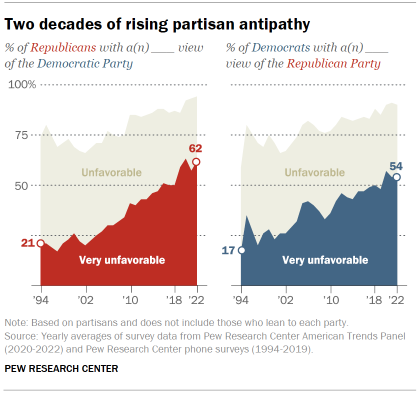
Deeply negative views of the opposing party are far more widespread than in the past. About six-in ten Republicans (62%) and more than half of Democrats (54%) have a very unfavorable view of the other party in Pew Research Center surveys conducted this year. While these highly negative views of the opposing party are little changed in the last few years, the share expressing this level of antipathy is higher than it was even five years ago, and considerably higher than it was a few decades ago. In 1994, fewer than a quarter in both parties rated the other party very unfavorably.



Be the first to comment